The State of Softball: How I See It
The State of Softball: How I See It

 Mark Griggs is one of the top club coaches in fastpitch softball and since starting the Wichita Mustangs in 2004 has placed players at universities in major conferences including the ACC, Big Ten Big 12, Pac-12 and SEC and played at a high level at ASA and PGF Nationals. Coach Griggs has a unique perspective as not only a coach but as a parent of a top recruit, daughter Emily, who will sign with LSU and was ranked #34 on the Hot 100 seniors list. Here are the coach’s thoughts on early recruiting and other key issues faced by college and club coaches as well as parents.
Mark Griggs is one of the top club coaches in fastpitch softball and since starting the Wichita Mustangs in 2004 has placed players at universities in major conferences including the ACC, Big Ten Big 12, Pac-12 and SEC and played at a high level at ASA and PGF Nationals. Coach Griggs has a unique perspective as not only a coach but as a parent of a top recruit, daughter Emily, who will sign with LSU and was ranked #34 on the Hot 100 seniors list. Here are the coach’s thoughts on early recruiting and other key issues faced by college and club coaches as well as parents.
*****
The State of Softball: How I See It
by Mark Griggs
Over the last few months, there have been numerous discussions regarding early verbal commitments in college softball.
I have read articles and heard comments that the travel ball coaches are driving this. Others believe it’s the college coaches making it happen. I have even heard it blamed on the “over-bearing parent.”
If someone were to ask me who I thought was driving this ship, I would say NOBODY.
I have spoken to many college coaches about the subject, and they all seem to say the same thing: “We don’t like it at all, we wish it would change, but if everyone is doing it, then we have to do it to stay competitive.”
The theory that it’s the over-bearing parent driving this has some merit, but honestly, it’s very little. Sure, parents want their daughter to get a scholarship to the school of her dreams. They also may like the idea of knowing what their future financial situation is going to be.

In reality though, parents only feel this way because they see it going on around them. I am not so sure they want their daughter to make an early decision as much as they don’t want their daughter to feel like she is being left behind. Truth be told, if all the kids decided to wait until their senior year to commit and that was considered the cool thing to do, you wouldn’t hear a peep out of parents about the recruiting of their 13 and 14 year-olds.
Next, is the theory that the travel ball coach is making all this happen. This theory is far and away the one that I don’t understand. Don’t get me wrong, I am not saying that the theory doesn’t hold water. I absolutely know coaches that are out there saying whatever it takes to get their players signed. I can also guess at some of the reasons (financial, prestige, ego, etc.) but, again, if there were no offers being made, all the reasons we are assuming that drive the travel ball coaches to push these young players to coaches wouldn’t have the chance to exist.
There it is, the three theories of why we have early verbals… it’s apparent that something has to change.
***
Here are the key questions that parents, college coaches, and travel ball coaches need to ask themselves:
1. College Coaches:
How many of your early verbals have not turned out the way you projected them?
Remember, we are not just talking about their softball skills, but look at the type of person you thought you were recruiting. Has her desire to play the game the way she did when you saw her changed? Is her personality the same as it was when you first talked to her as that cute little 14 year-old? How has she changed physically?
I have been coaching for a little while now, and as a father of four girls I know there are major changes in a young girl’s body between the ages of 14 and 19. I am absolutely positive there is a major change in the way they think from age 14 to 19.
Do you really know what your going to get when you verbal an 8th, 9th or 10th grader? The honest truth is positively not!
Think about the last time you actually took a home visit before making an offer. Ask yourself how much more you would know about these kids if you did.
Most of your athletic directors base your success on wins and losses and the type of kids you are bringing into the program to represent the university. Now ask yourself if you really feel comfortable putting your career in the hands of a 14 year-old girl.
2. Travel Ball Coaches:
For the most part, I believe travel ball coaches are doing it for the right reasons. I am sure that there are some coaches that make money at this. I am sure there are many that lose money, but at the end of the day, no matter if you do this for a living or do it as a passion, you love to see the success of the kids you coach.

Ask yourself how much of your time is spent on recruiting now and how much of it is spent on coaching? Is recruiting the reason you decided to coach? I would bet that most of you, and I mean 99%, got into this for the love of teaching—teaching the correct way to field a ball, the mechanics of hitting, the mental part of the game, and the love of the game.
I can’t imagine anyone getting into this for the sole reason of putting kids in college. I am sure that you have all felt the joy of watching your players grow into great ball players. Yes, there is plenty of joy in seeing one of your kids going off to college on scholarship to play ball.
Now, I want you to think what our job “should be.” I believe we are there to teach the game of softball, but we are also there to help them grow and mature into strong young ladies.
We spend an enormous amount of time with these kids, and we have a great deal of influence over them. Isn’t part of our job to also protect them?
When one of your 14 year-old players, who is getting ready to go on her first “unofficial visit,” calls you and asks you, “Coach, what kind of questions should I ask?” shouldn’t that be a red flag that she is not ready to make a decision that will affect the next eight years of her life?
We as travel ball coaches take a lot of pride in our players getting scholarships, but is our pride getting in the way of just good old common sense?
3. Parents
Your part in this is more understandable than the others. As a parent myself, I never want my children to feel like they are “being left behind.”
I honestly believe that if things changed in recruiting, it would be OK with you.
However, we as parents still have to take responsibility for some of this. If you are a parent of an 8th, 9th, and 10th grader, how many times have you talked to your kid about college? How many times have you asked your coach about recruiting? How much time do you spend looking at blogs and signings and how often do you feel like you need to be on top of this?
If you’re honest with yourselves, you spend a lot more time than you thought you did.
Do you spend the same amount of time knowing all about your daughter’s friends, her academics, her reputation, and her social media profiles? If you can answer yes to all that, then my hat is off to those super-parents, because in today’s world I am not sure there is enough time in the day to do all that needs to be done.
As parents, we decide on curfews, the type of movies and events that our children can attend, how they dress, etc. In most states, many of these kids are not even at the legal age to drive yet.
As good parents we try and put our kids in the best possible position to be safe and successful. We now need to ask ourselves, “Why are we letting our 14 and 15-year-old daughters make decisions so early about college?”
Think about how many times we have heard our kids say that this boyfriend is the one. We, as parents, know there is about a 99% chance that he isn’t in her future! If we have such little faith in our daughter’s convictions about love at this age, then why do we feel any different about their feelings about where they want to go to college?
I am sure that many of you can add a lot of questions and statements to any of the three categories above. However, trying to lay blame on any one group will still not solve the real issue: how do we stop early recruiting?
Before I attempt to lie out a plan that would certainly curtail, and maybe even stop, early recruiting, please understand that I don’t feel the plan is without “holes.”
I am just hoping to get things started moving in the right direction!
***
Here are three ideas that should be open for discussion:
1. Age Classifications
Let’s first start with the age classifications for most sanctioning softball events, i.e. ASA, PGF, TCS, and USSSA.
Currently, divisions are determined by a maximum age. What if we established a minimum along with the maximum? I would like to see the age maximum stay the same, but would like to see a school year minimum added. Here are some examples: If you would like to play in the oldest division you cannot turn 19 by January of the summer you want to compete. You also must have completed your sophomore year in high school.

This will accomplish several things. College coaches want to see what players can do against the type of players they will be playing against when they get to college. Adding the minimum will enable college coaches to evaluate talent on a much different level.
Additionally, it will stop the travel ball coaches from bringing kids up in the organization too early. This, in turn, will help the older players get more playing time.
Think about who gets the short end of the stick when a college coach is there to watch a team, and the coach puts in his 14-year-old to showcase. Those players that put in all their time now sit while the younger gets showcased.
Doing an age minimum would also make the younger age groups more competitive.
You might ask how this would slow down early recruiting. Well if a young player is dominating as a pitcher in 16U, I believe coaches would be more skeptical about the type of hitters she is facing. The same could be said for a dominating hitter: what would they do against more mature hitters or pitchers?
Yes, I believe coaches can evaluate “talent” at a young age, but what they can’t evaluate is how much pressure a player can handle or how they will mature. I think the number of 16-year-old teams would increase dramatically and believe so too would the number of 18 year-old teams.
This separation would give the girls more time to develop and mature into a player that will be recruited. Today, kids almost feel like if their not playing “gold” ball then they won’t make it. We have sped the process up way too fast.
2. Unofficial Visits
Next, let’s talk about “unofficial visits.”
Frankly, I feel that they shouldn’t be allowed. If a child wants to go to “X” college, by all means go and see it, take a tour, talk to admissions, etc., but at no time should anyone from the softball program at that university or college be allowed to have contact with the prospective student.
Contact between coaches or players of the university should not be allowed, even on campus. Players today are attending a lot of camps on the college campus and you might ask how to stop communication between players and coaches at a camp. I don’t believe you can or you should.
If a coach wants to show the campers the softball facilities during the camp, they would be allowed, but nothing else can be part of that tour. If a coach wants to address the campers about recruiting, they can do it with all campers present. If there are any one-on-one “private” conversations, it would be considered a violation.
I am not trying to hinder college camps, I am just suggesting that we get back to what camps at one time were about: teaching. They should not be a tryout!
3. Official Visits
Official visits are next on the list.
Players are allowed five official paid visits, but I can assure you that today 99% of softball recruits are only taking one official visit.
They commit at such an early age, there is no reason to take any visit but to the school they committed to two to three years prior.
Let’s change things up a little. We should allow college coaches to have contact through email with players starting on the day they finish their sophomore year of high school. Kids can share their summer schedule and coaches can express their interest.
We should then permit official visits to begin the day they start their junior year in high school. I believe the changing of the rules on “unofficial visits” and official visits will drastically change the landscape of early recruiting.
***
I know the little suggestions I made will not stop all the early recruiting. I know that college coaches will still talk to the travel ball coaches of the younger teams, and express their interest in certain players.
My hope, however, is that the suggestions above will deter girls from committing early and that college softball recruiting can return to a more traditional student-athlete courtship.
My suggestions alone will not put an end to early commitments. Ideally, it would force girls and coaches alike to incur additional risks in committing early that hopefully neither would be willing to take.
With that being said, early verbals will still happen, but just because it will still happen doesn’t mean we shouldn’t try and do something about it.
Related Content
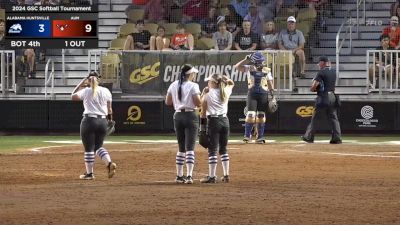 Replay: Gulf South Softball Champ - Game 12 - 2024 UAH vs Auburn University | May 3 @ 7 PM
Replay: Gulf South Softball Champ - Game 12 - 2024 UAH vs Auburn University | May 3 @ 7 PMMay 4, 2024
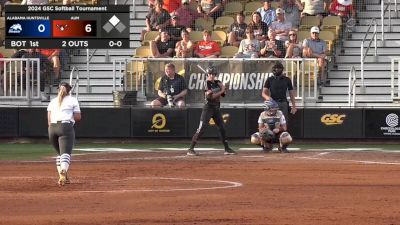 Replay: Gulf South Softball Champ - Game 12 - 2024 UAH vs Auburn University | May 3 @ 6 PM
Replay: Gulf South Softball Champ - Game 12 - 2024 UAH vs Auburn University | May 3 @ 6 PMMay 4, 2024
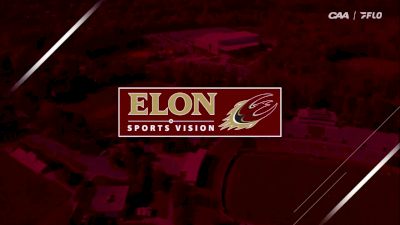 Replay: Drexel vs Elon - DH | May 3 @ 2 PM
Replay: Drexel vs Elon - DH | May 3 @ 2 PMMay 4, 2024
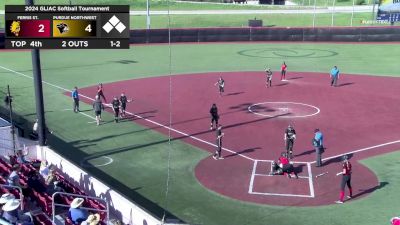 Replay: GLIAC Softball Champ - Day 2 | May 3 @ 4 PM
Replay: GLIAC Softball Champ - Day 2 | May 3 @ 4 PMMay 3, 2024
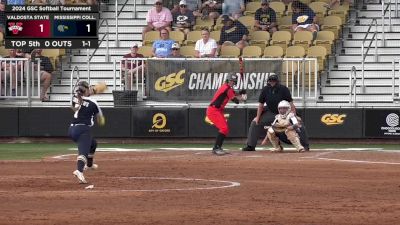 Replay: Gulf South Softball Champ - Game 11 - 2024 Valdosta State vs MC | May 3 @ 4 PM
Replay: Gulf South Softball Champ - Game 11 - 2024 Valdosta State vs MC | May 3 @ 4 PMMay 3, 2024
 Replay: Lycoming College vs Susquehanna - DH - 2024 Lycoming vs Susquehanna | May 3 @ 6 PM
Replay: Lycoming College vs Susquehanna - DH - 2024 Lycoming vs Susquehanna | May 3 @ 6 PMMay 3, 2024
 Replay: Butler vs Villanova | May 3 @ 5 PM
Replay: Butler vs Villanova | May 3 @ 5 PMMay 3, 2024
 Replay: Campbell vs Delaware - DH | May 3 @ 5 PM
Replay: Campbell vs Delaware - DH | May 3 @ 5 PMMay 3, 2024
 Replay: Monmouth vs UNCW | May 3 @ 4 PM
Replay: Monmouth vs UNCW | May 3 @ 4 PMMay 3, 2024